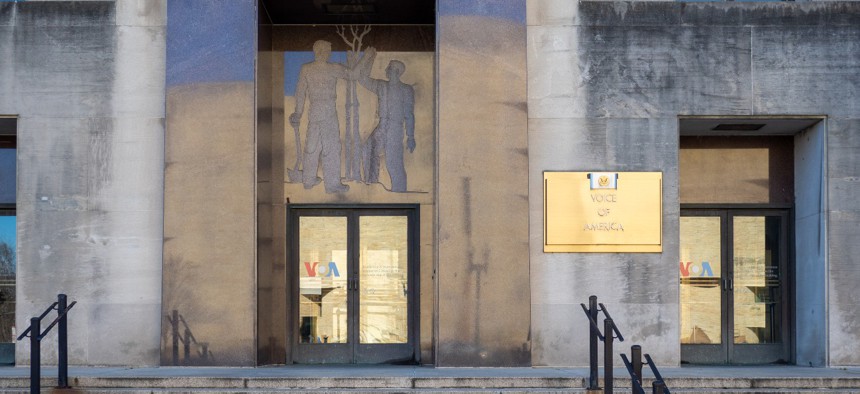
IG says the firewall to ensure independence from government interference should be better defined. Rhododendrites, via Wikimedia Commons
A Watchdog Says the Global Media Agency Lacks Clear and Consistent Policies to Ensure Editorial Independence
The finding comes as part of a “targeted inspection” of the agency’s editorial independence and journalistic standards.
The firewall preventing government interference in the taxpayer funded media agency isn’t clearly defined, therefore the agency should update its guidance on it, a federal watchdog determined recently.
The State Department inspector general released a report on October 13 based on its “targeted inspection” of editorial independence and journalistic standards and principles at the U.S. Agency for Global Media and its five broadcasting networks: Voice of America, the Office of Cuba Broadcasting, Radio Free Europe/Radio Liberty, Radio Free Asia and the Middle East Broadcasting Networks. The agency has been working to rebuild trust and credibility following the tenure of controversial CEO Michael Pack at the end of the Trump administration.
“[The Office of Inspector General] determined that the legislation, regulations, grant agreements, and guidance governing network editorial independence did not clearly or consistently define editorial independence and the firewall,” the report said.
Staff from the U.S. Global Media Agency and the network it funds told the IG office that they thought some of the actions by Pack and his top officials were possible violations of the firewall, but they also said “that unclear and inconsistent definitions of editorial independence and the firewall contributed to uncertainty about what constituted a firewall violation and to an uneven understanding at the working level about firewall protections,” even when a regulation clarifying the firewall (which Pack repealed) was in place. The IG also found that the agency’s internal procedures to handle firewall violations and issues were outdated.
Among its recommendations, the IG said the U.S. Agency for Global Media should update and then share firewall guidance and procedures. The agency agreed and expects this to be completed this fiscal year.
In a report issued last year, the Government Accountability Office suggested that Congress consider legislation to define the firewall’s parameters. So far, no such legislation has been enacted. Acting VOA Director Yolanda López told Government Executive in an interview over the summer that the firewall remains in place, but could be stronger.
The watchdog found that the global media agency and its networks' leadership “modeled journalistic standards and principles and consistently communicated support for the firewall and journalistic standards,” except it found shortcomings at the Office of Cuba Broadcasting.
The IG found that the Cuba office’s leadership didn’t “consistently communicate journalistic standards objectives and priorities to its staff.” Also, staff told the IG that “they were unaware of or not participating in [the office’s] program review, a major initiative for [the office] and [the U.S. Agency for Global Media] to ensure adherence to journalistic standards.”
The IG determined that the global media agency and the five networks had written journalistic standards and principles in accordance with the law and for the most part the networks “exercised appropriate editorial control through these mechanisms, which were not only important tools to identify and address lapses in journalistic standards but were also intended to prevent similar future occurrences.” However, the Office of Cuba Broadcasting and Voice of America had issues in at least one aspect of these mechanisms, which “jeopardized full adherence to journalistic standards.”
For example, both lacked written procedures on how to address lapses in journalistic standards. Also, VOA’s standards editor had unclear authority as it “rested on a shared, unwritten agreement,” said the report.
All of the networks had orientation materials for new staff that outlined journalistic standards and editorial independence, but the journalistic standards varied among them. Also, the IG found that the Office of Cuba Broadcasting’s training was only offered in English, which hindered employees’ full understanding of it.
The review was done from March 2021 to January 2022 and covered the period of June 2020 to November 2021. This spanned Pack’s tenure at the agency and the first 10 months of the Biden administration.
The IG did not access the networks’ journalistic content because the 1994 U.S. International Broadcasting Act prevents the IG from reviewing the philosophical and political perspectives in broadcasting content. Altogether, the IG offered nine recommendations to the U.S. Agency for Global Media, Voice of America and Office of Cuba Broadcasting.
“USAGM and network management have reviewed the report’s nine recommendations and are already planning appropriate actions in response,” then-acting CEO of the U.S. Agency for Global Media Kelu Chao wrote in September, in response to the draft report. Due to the fact that “all inspections represent a snapshot in time,” she outlined improvements the agency and networks have already taken since the review ended and noted that the networks have already taken action to address some of the IG’s recommendations.
Additionally, Chao said her agency appreciates the watchdog’s detailed review of the firewall as “the credibility and adherence to the highest standards of professional journalism require a guarantee that USAGM networks are independent from political influence.”
Since the IG conducted its review and the agency responded, the Senate voted 60-36 to confirm Amanda Bennett, former VOA director, to be CEO of the U.S. Agency for Global Media.







